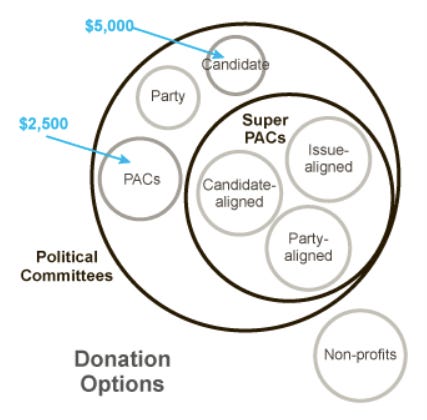Citizens United--Part II
Dear Group,
It is all about framing, labelling so as to confuse the listener, providing words that light up an image in the listener's brain. The Republican/Libertarian machine understands this well. Framing is so insidious that the words are soon taken up by the opposition. With each use of the words by a discussant the framer's point of view is reinforced.. [A recent glaring example I covered is the "Hearing Protection Act."] For a concise but detailed analysis of framing I strongly encourage reading George Lakoff's Don't Think of an Elephant. (See References below)
Framing is so insidious the listener falls for it unaware. So it was with "Citizens United." For anyone not fully engaged in the issue, the words "Citizens United" light up a mind frame populated by earnest fellow Americans. How can an issue populated with our fellow citizens be a threat to democracy? Why would we want to End Citizens United? The choice of name for a group now led and nurtured by Trump's friends, a group started and funded by the mega-wealthy, is pure genius. It puts the opposition at the immediate disadvantage of having to explain how anything led by "Citizens" is a threat. "Citizens United" telegraphs a mental image that requires a paragraph of rebuttal to re-label. It is a marvelous soundbite in a world of distraction. If you missed Part I what the organization Citizens United really is, click here.
Onward now to Citizens United v. the Federal Election Commission. The Republican operatives who brought this case under cover of the words "Citizens United" had a narrow focus. Their original hope was to have the courts overturn a part of the McCain-Feingold Act of 2002 that was aimed at curbing:
The proliferation of issue advocacy ads, by defining as "electioneering communications" broadcast ads that name a federal candidate within 30 days of a primary or caucus or 60 days of a general election, and prohibiting any such ad paid for by a corporation (including non-profit issue organizations such as Right to Life or the Environmental Defense Fund) or paid for by an unincorporated entity using any corporate or union general treasury funds. (wikipedia, FEC website)
Let's pause here for a moment and consider the Bipartisan Campaign Reform Act of 2002 (BCRA, McCain–Feingold Act of 2002. Take note that BCRA passed when there were still Republican Senators besides McCain, Collins, and Murkowski who sometimes voted issues instead of Party loyalty. (See the vote here.) The same was true in the House. (See the vote.) This law actually was bi-partisan. Republicans as well as Democrats recognized the threat to democracy posed by the incendiary mixture of big money and the modern communication of the time (2002). Were a vote on a bill like McCain-Feingold (BCRA) to come up in Congress today the Republican Party would vote against it en bloc. Such is the stranglehold the Libertarian mega-wealthy have on the Party.
Back to Citizens United v. the Federal Election Commission. David Bossie (president of Citizens United and intimate of Donald Trump) and company were only hoping to overturn the prohibition on electioneering communication in the 30 days before a Primary or 60 before a General Election. They didn't count on the conservative Justices, Roberts, Scalia, Alito, Thomas, and Kennedy engaging in an act of breathtaking judicial activism, expanding their ruling from a surgical strike at a limited part of BRCA to one that would strike down decades of campaign finance law, a ruling that would open the door to unlimited dark and gray money funding unchecked, slick propaganda that incessantly pummels us everywhere we look and listen.
The whole story of Citizens United v. the Federal Election Commission is covered by Jeffrey Toobin in a 2012 article in The New Yorker with all its political intrigue. [Yes, I did say "political" in reference to the Supreme Court.] In order to get the broad result the conservative justices wanted, Roberts strategically arranged to have it argued twice in two different Supreme Court terms. The second time the plaintiffs were prompted by Roberts to be more expansive in what they were asking. By pitching the re-argument into another Supreme Court term, Roberts also kept retiring Justice David Souter (a traditional Republican) from publishing what would have been a scathing dissent shining a light on the political nature of the Court. Souter's intended dissent, according to Toobin, "...accused the Chief Justice [Roberts] of violating the Court’s own procedures to engineer the result he wanted."
Learn this bit of history, bring it up in conversation. Talk about it with anyone who will listen. Fight the framing war. "Citizens United" is merely the Orwellian naming of an organization bent on subverting democracy while pretending to represent "citizens'" free speech interests.
I tentatively plan a Part III to provide more detail on what Citizens United accomplished for its mega-wealthy backers. We live daily with its consequences in the media we are fed.
Keep to the high ground, Jerry
P.S. I retain the diagram below to offer context. Everything the Citizens United v FEC decision touches on is in the Super PAC's and Non-profits circles. However, the decision's effects overwhelm what is allowed in the traditional Political Committees crescent in the upper left.

This diagram is from a 2014 interactive article in the NYTimes. It is a great place to start understanding the effect of money in our politics. The limits on contributions are indexed to inflation, so the illustrated limits are now higher, e.g. $5400 can be given directly to a Candidate's election committee ($2700 for the Primary and $2700 for the General election), and a conventional political action committee (PAC) can receive $5000 from an individual donor.


